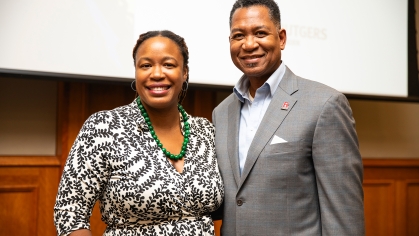Rutgers Law School professor’s wide-ranging book prepares lawyers to represent clients in civil cases
A new textbook co-authored by Rutgers Law School in Camden professor J.C. Lore will educate law school students and practicing lawyers throughout the United States to effectively represent clients in civil cases, from the moment they meet the client until trial.
Most civil cases reach a resolution without a trial. The overburdened court system has been transformed radically in recent years, with fewer than 5% of civil matters heard before a jury.
In Pretrial Advocacy, published by the National Institute for Trial Advocacy and Wolters Kluwer, Lore and co-author Reuben Guttman say that, due to modern civil litigation, lawyers now need to prepare from the start of a civil case as if they would be presenting a case to a jury.
Lore and Guttman say lawyers are challenged early on in the pretrial process to consider the rules of evidence and civil procedure as they gather information to plead a plausible complaint.
“In prior years, lawyers were able to basically file a complaint and do a lot of the work after the filing of the complaint,” explains Lore, a distinguished clinical professor and director of trial advocacy at Rutgers Law in Camden. “Now, the system is set up so you really have to have a lot more ready when you file that complaint. There must be a lot more support for that complaint, or the judge is more likely to dismiss it.”
Lore says the pretrial process is laden with unwritten norms. “All parties – from litigants to jurists – struggle to provide efficient resolutions while balancing due process. We wanted to write something that explains it all.”

J. C. Lore
The book offers guidelines to represent clients from the moment a client contacts the lawyer, through the trial, encouraging lawyers to engage in strategic decisions about pretrial discovery and motion practice. Why depose this witness rather than another? What is the purpose? What are the salient documents that support the narrative?
The high price of litigation – costing thousands of dollars a day – is a major reason cases are not going trial.
“It has become a very expensive game that unfortunately is played by more wealthy individuals,” Lore says. “Cases that involve individuals who don’t have a lot of resources are those cases that don’t go to trial as much.”
In the book, the authors address the professional conduct of lawyers. They say many lawyers are becoming more combative and less professional. Lore and Guttman challenge this trend throughout the book by suggesting ways in which lawyers can help solve problems and raise their level of professionalism while helping their clients.
The authors dedicate the book’s final chapter to public interest litigation to provide competent representation for people who are harmed, in ways such as race and gender discrimination, someone who is catastrophically injured because of neglect of a large company, and organizations that retaliate against whistleblowers.
“If people can’t find representation, those cases never get brought forward, and positive change never happens,” says Lore.



